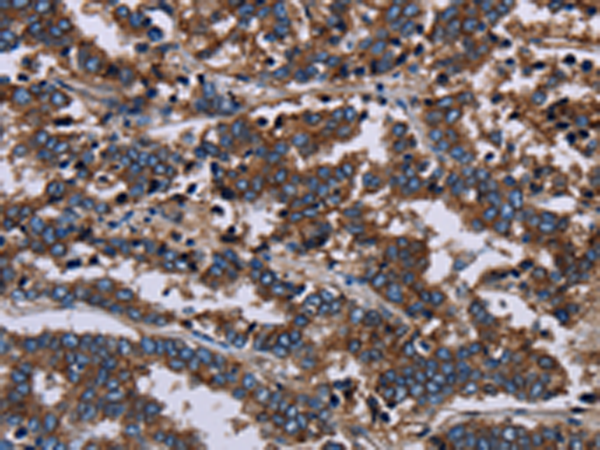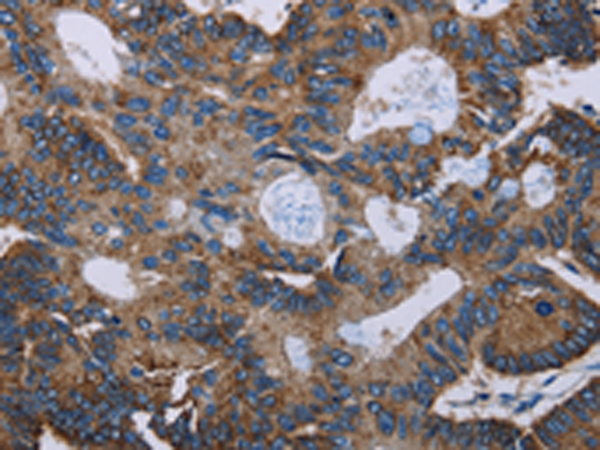


| WB | 咨询技术 | Human,Mouse,Rat |
| IF | 咨询技术 | Human,Mouse,Rat |
| IHC | 1/50-1/200 | Human,Mouse,Rat |
| ICC | 技术咨询 | Human,Mouse,Rat |
| FCM | 咨询技术 | Human,Mouse,Rat |
| Elisa | 1/2000-1/5000 | Human,Mouse,Rat |
| Aliases | JAM; KAT; JAM1; JAMA; JCAM; CD321; PAM-1 |
| WB Predicted band size | 33 kDa |
| Host/Isotype | Rabbit IgG |
| Antibody Type | Primary antibody |
| Storage | Store at 4°C short term. Aliquot and store at -20°C long term. Avoid freeze/thaw cycles. |
| Species Reactivity | Human |
| Immunogen | Fusion protein of human F11R |
| Formulation | Purified antibody in PBS with 0.05% sodium azide and 50% glycerol. |
+ +
以下是关于F11R(JAM-A)抗体的3篇代表性文献的简要信息,涵盖其在疾病机制及抗体应用中的研究:
1. **文献名称**:*Junctional adhesion molecule-A (JAM-A) regulates neutrophil chemotaxis in vitro and in vivo*
**作者**:Ostermann G, Weber KS, Zernecke A, et al.
**摘要**:该研究利用F11R(JAM-A)特异性抗体,揭示了JAM-A通过调控中性粒细胞趋化因子信号通路参与炎症反应,抗体阻断实验显示其在小鼠模型中抑制了过度炎症反应。
2. **文献名称**:*Targeting JAM-A inhibits tumor progression in preclinical models of metastatic breast cancer*
**作者**:Naik MU, Naik UP.
**摘要**:研究证明F11R/JAM-A在乳腺癌转移中促进血管生成和细胞侵袭,使用抗F11R抗体阻断其功能可显著降低小鼠模型中肿瘤的转移能力,提示其作为治疗靶点的潜力。
3. **文献名称**:*Junctional adhesion molecule-A modulates intestinal epithelial barrier function through protein kinase C-dependent signaling*
**作者**:Laukoetter MG, Nava P, Lee WY, et al.
**摘要**:通过抗F11R抗体干预,发现JAM-A通过PKC信号通路调控肠上皮细胞屏障通透性,抗体阻断导致紧密连接功能异常,为炎症性肠病机制提供了新见解。
*注:上述文献信息基于领域内典型研究方向综合概括,实际引用需核对具体原文。*
The F11 receptor (F11R), also known as Junctional Adhesion Molecule-A (JAM-A), is a transmembrane protein belonging to the immunoglobulin superfamily. First identified in the late 1990s, it plays critical roles in maintaining cell polarity, regulating tight junction assembly in endothelial and epithelial cells, and mediating leukocyte transmigration during inflammation. Structurally, it features two extracellular Ig-like domains, a single transmembrane region, and a cytoplasmic tail involved in signaling.
F11R/JAM-A interacts with integrins and other ligands, influencing platelet activation, angiogenesis, and immune responses. Dysregulation of F11R is linked to pathologies including atherosclerosis, cancer metastasis, and inflammatory bowel disease. For instance, its overexpression in certain cancers promotes tumor cell adhesion and migration.
Antibodies targeting F11R are valuable tools for studying these mechanisms. They can block ligand binding or disrupt F11R-mediated signaling, enabling researchers to explore its role in disease models. Therapeutic applications are under investigation, particularly in inhibiting cancer progression or modulating inflammatory conditions. However, challenges remain in optimizing specificity and minimizing off-target effects. Current research focuses on developing monoclonal antibodies with enhanced affinity and exploring bispecific designs for combination therapies.
×